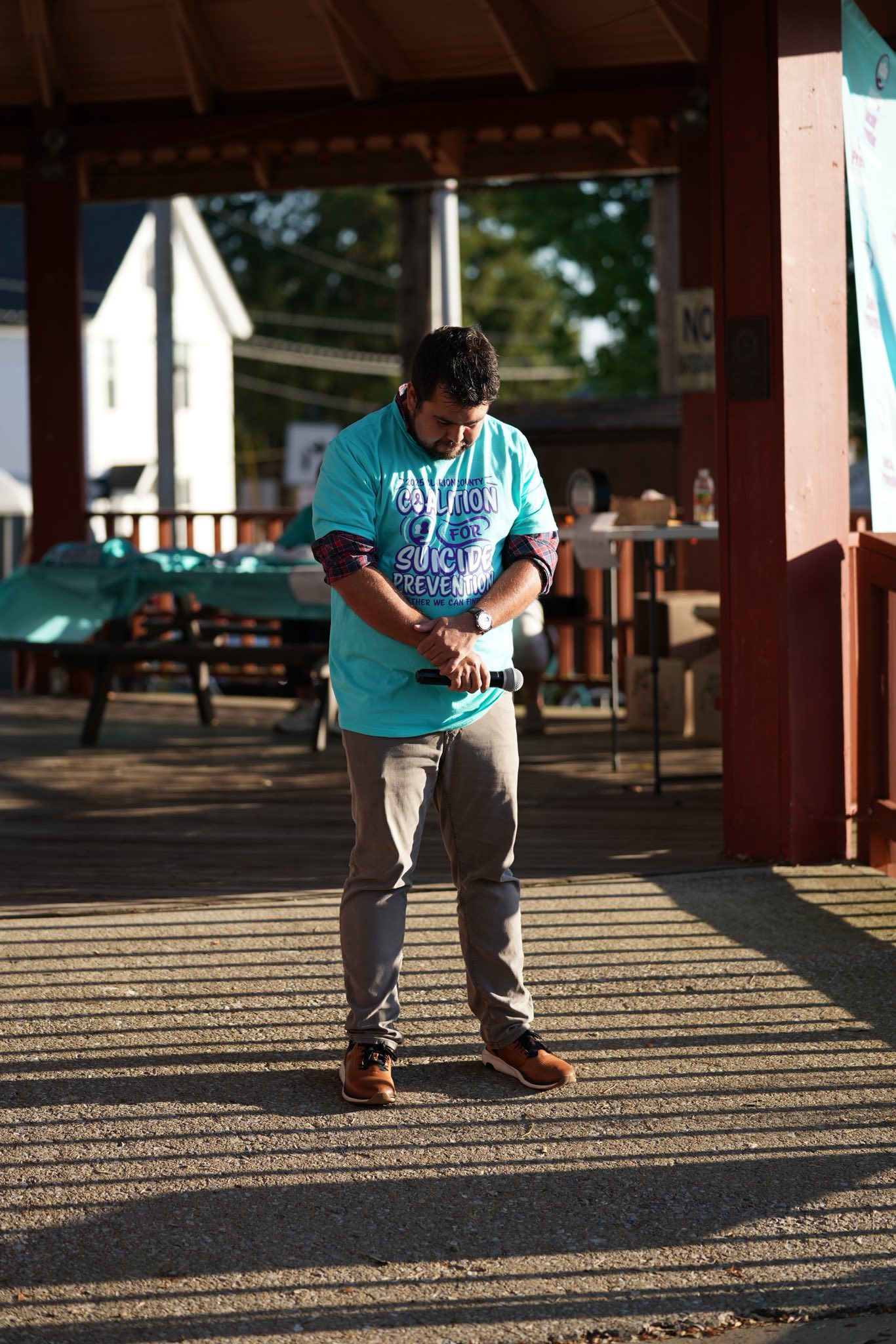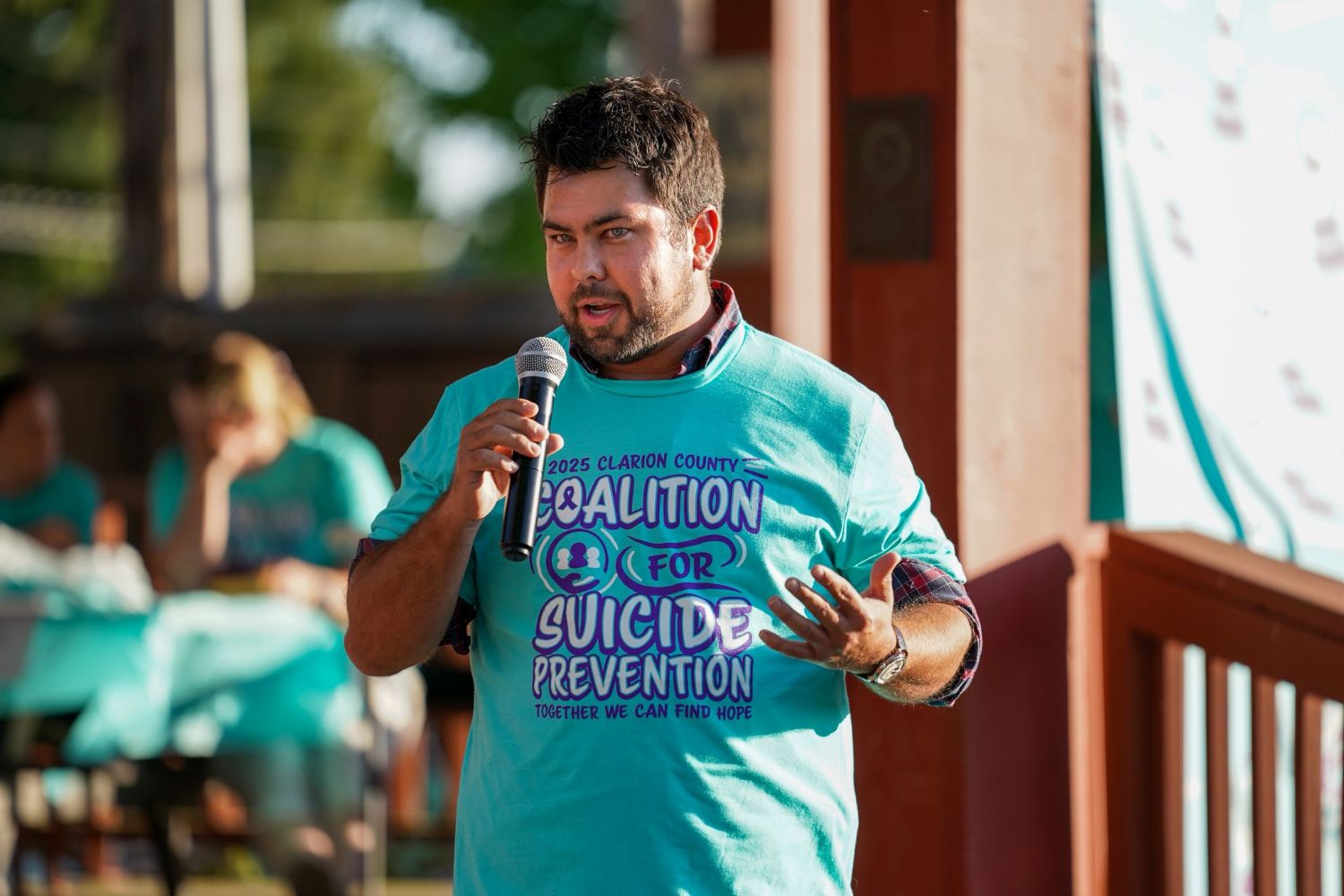Photo by Saddle & Spur Photography. Courtesy of Clarion County Coalition for Suicide Prevention.
CLARION, Pa. (EYT) – Clarion County Commissioner Braxton White spoke at Thursday night’s annual Suicide Awareness Walk, intentionally choosing to be open about his own mental health struggles.
In an interview with exploreClarion.com ahead of the event, White shared that his challenges began in 2024 and intensified during the breakdown of his marriage. Despite the sensitivity of his position, he felt it was important to share his story.
White expected some people would be surprised to learn the details of his struggle. He hoped that sharing his experience would help others feel less isolated.
The absence of a traditional support system left him vulnerable to depression, he said. He was raised by his great-grandparents and lost them both when he was in his early twenties.
“My father was an alcoholic. He died when I was 20 on his way home from the bar,” White said. “My mom had a lot of undiagnosed mental health issues. She passed a couple of years ago, but we didn’t have much of a relationship as I got into adulthood.”
Friends provided some support, but for him, his marriage was the foundation of his personal life, White noted.
White said the collapse of his marriage in 2024 was the moment he knew he would be tested mentally. The separation represented not only the end of a relationship but also the loss of his closest companion, according to White.
“I considered her my best friend,” he emphasized. “Anywhere you’d see me, you’d see her, too. We did everything together. I had all my eggs in that basket.”
White described the grief of divorce as complicated, especially in his case, where there was no abuse or constant conflict. He said the separation felt like an unexpected loss that left him confused and struggling to process what had happened.
He sought professional help right away. However, he said it took nearly six weeks from the time he first reached out until he could meet with a therapist in person, a delay that added to his struggles.
Grief, White said, slipped into depression during that wait. He stopped sleeping, and the exhaustion made everything worse. The lack of rest deepened the misery until he felt overwhelmed and desperate for the pain to end.
He said the first time suicidal thoughts surfaced was in May of last year, after weeks of sleeplessness and mounting grief. According to White, the thought was not a plan at first, but a persistent idea that “this would be easier if I was just dead.”
A few hours after that first moment, a small, hopeful incident made him think the feeling might pass.
“I was at Michelle’s getting a coffee, and they gave me this mug covered in hearts. It was a surreal moment, very hopeful, and I thought, maybe that’s it. Maybe that’s the only time I’m going to feel this.”
A week later, the darkness returned, harder than before.
He recalled a friend had cautioned him that the struggle could intensify and asked him to promise to reach out if it did. About a month later, he kept that promise, calling the friend and asking to be taken to the hospital.
He said he left Clarion for care because he did not want to be treated locally. White said he went to UPMC in Venango County, and that the intake process was humbling. He described being placed in a room designed to keep patients from harming themselves, where he was under constant observation.
“I was so ashamed, embarrassed, angry. Aside from all of that, I was resigned to the idea that people would find out and think I was crazy,” he noted.
White said he spent two nights at the hospital after self-committing. He said the experience was validating because staff treated him seriously and because he met people who were facing visible struggles.
After leaving the hospital, White said he changed how he cared for himself. He read a book called Unfu*k Yourself and said one line helped reframe his thinking.
“I remember one quote: ‘We aren’t the words we say, we’re the actions we take.’ It really helped me think differently.”
He also received encouragement from Senator John Fetterman, who had been through a similar episode. White noted that Fetterman told him he would come through it and that people would not view him differently.
White started walking, exercising, and listening to music again. He said he lost about 30 pounds in a six-week stretch during the worst of his depression and gained the weight back as he recovered.
White credited friends and neighbors with keeping him afloat after his hospitalization. He said his best friend from high school took him in, and others gave him space to sleep and talk while he regrouped.
“They were there for me when I needed them,” he said. “People I work with knew I was struggling, but didn’t know it had gotten to that point. For most of my office, it’s going to be a surprise when they see all this in the paper.”
He said he hasn’t had suicidal ideation since leaving the hospital. He described ongoing care, including therapy and a broader set of supports. He also described a new, public focus on improving mental health resources in the county, saying he has formed a task force with the county mental health director, the coroner, law enforcement, the university, local school districts, the VA, and grant administrators to look for practical improvements in programming and family support.
White said the larger point he planned to make at the walk was simple: This can happen to anyone, and asking for help is not something to hide.
“My message is that it’s okay to not be okay, and it’s okay to ask for help. When somebody does, they shouldn’t be ashamed. We should celebrate someone having the courage to do that.”
White said recovery after his hospitalization was gradual. The depression did not lift immediately, but the darkest thoughts did not return.
Since then, he has focused on building healthier habits. Walking and hiking became regular outlets, music gained new significance, and cooking, which he has always enjoyed, provided a way to stay grounded.
According to White, he has also worked to broaden his sense of connection with others. He said he strengthened existing friendships, built new ones, and learned to accept support more freely.
“I’ve spread it out more,” he said of his relationships. “I’ve taken acquaintances and built them into strong friendships.”
The most important outcome of the experience, he said, was a stronger relationship with his son.
He has also found himself in new situations, including dating for the first time in two decades. Though he approached it with hesitation, he found the experience more positive than expected.
The story he once imagined for his life changed completely, but he is content with where he is now. He described himself as happy, hopeful, and grateful for the community support he has received, and he wants to use his experience to help others facing similar struggles.
White said that part of his reason for speaking publicly is to push for better access to care. He noted that even with health insurance and the ability to navigate the system, it still took him six weeks to see a therapist in person.
“That’s an access problem,” he said.
At the policy level, county commissioners have repeatedly sought increases in mental health funding, but those requests have been turned down. He described the call to address mental health as a political talking point that rarely leads to action, noting that little funding is ever approved.
He said he believes county programs need to be properly funded and that staff need to be paid at levels that reflect the weight of their work.
“The goal is to figure out how we can do this better. What programming can we improve, and how can we better support families after they lose someone? I can’t imagine losing somebody close to me this way. It has to be the worst way to lose someone.”
While speaking openly about suicidal ideation is difficult, he has found purpose in being transparent. He said he does not want his son to ever doubt his importance in his life, “because he matters more than anything. He is the light in the world.”
There is hope on the other side of depression and that recovery can open new opportunities, he said.
White has found meaning in new friendships, in time outdoors, and in broadening the ways he connects with others. He said co-parenting with his ex-wife has been positive, adding that he is happy for that.
“There’s a whole lot to be hopeful for,” he said. “I’m grateful to take what I’ve experienced and try to pay it forward to help others when they’re in my shoes.”
 Photo by Saddle & Spur Photography. Courtesy of Clarion County Coalition for Suicide Prevention.
Photo by Saddle & Spur Photography. Courtesy of Clarion County Coalition for Suicide Prevention.

